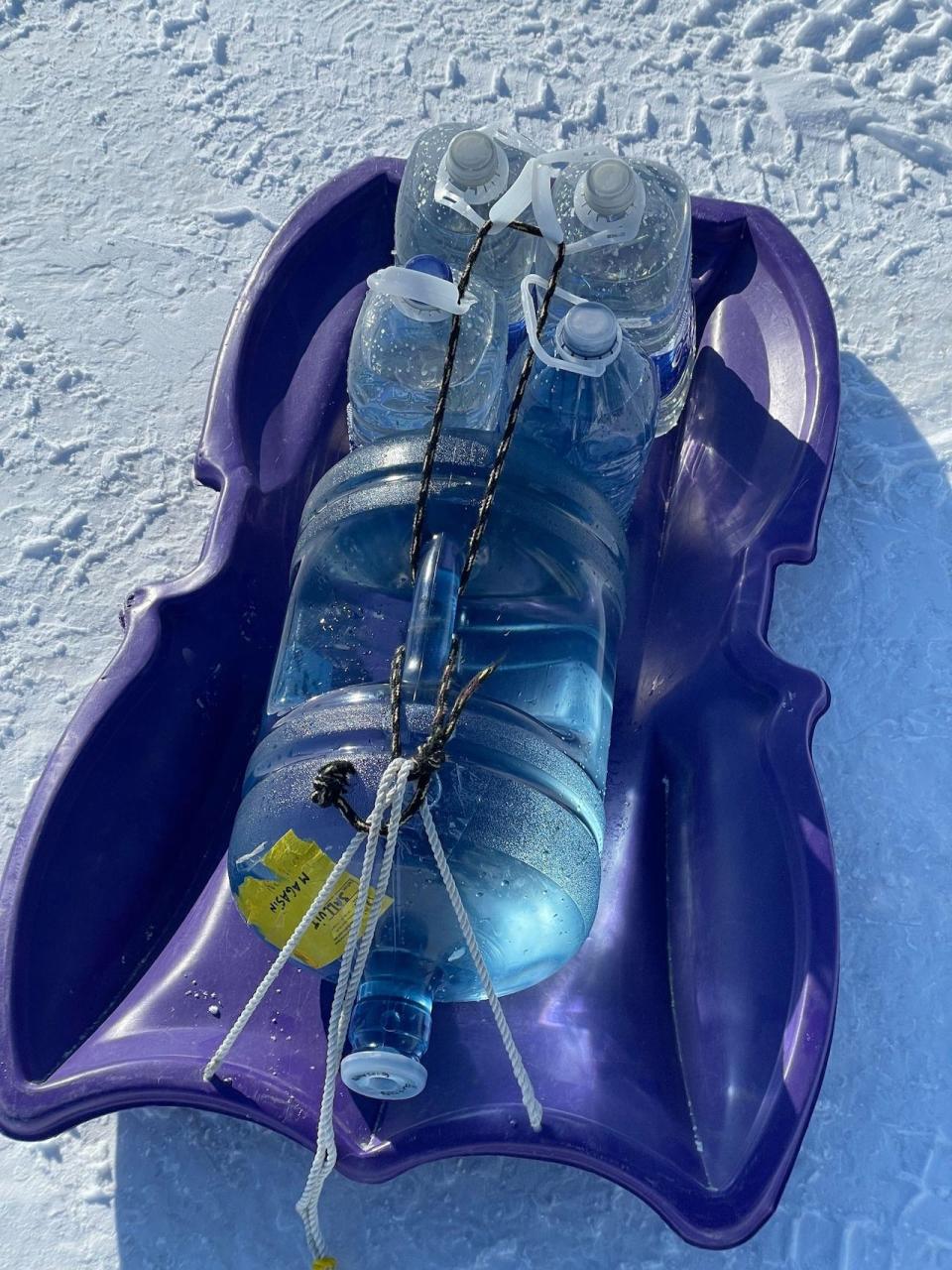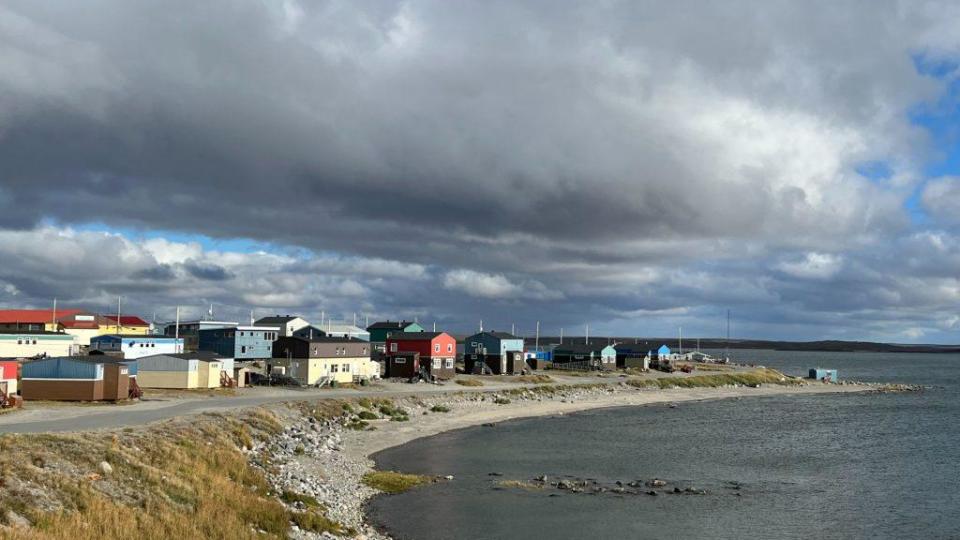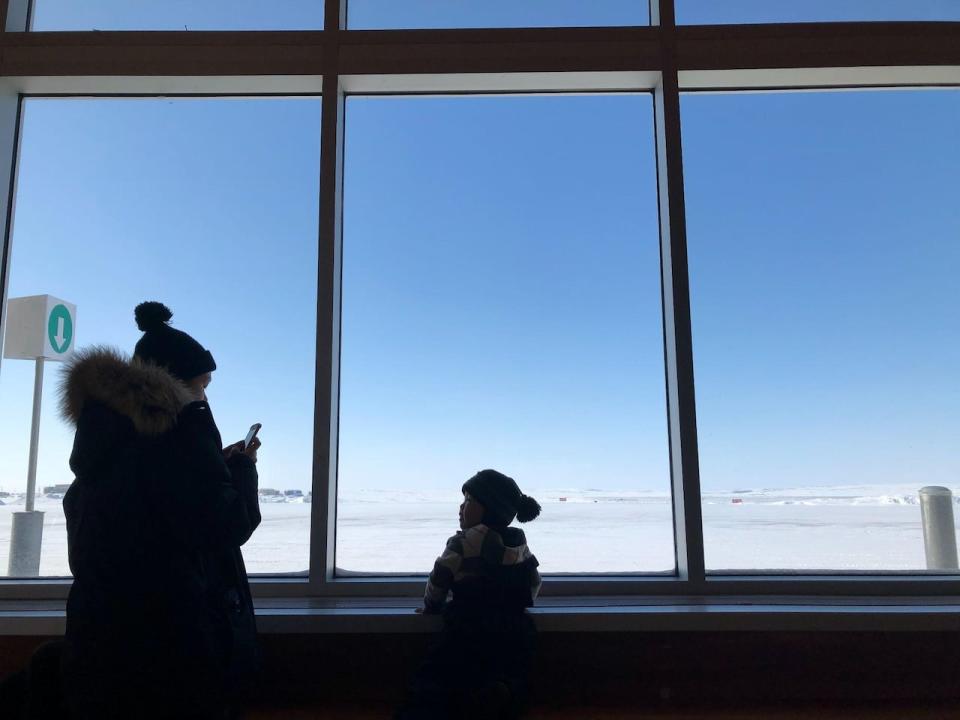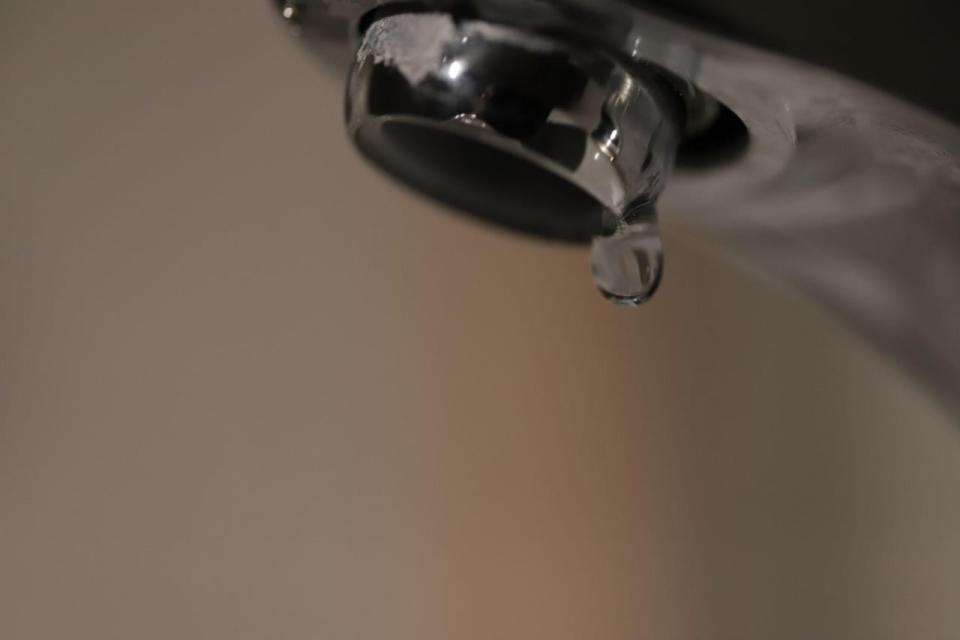No showers, full sewage tanks: Nunavik residents say water system can't meet growing demand

Dr. Sarah Bergeron is used to improvising when the water runs dry in her community in Puvirnituq, Que.
She washes her hair in a bowl and throws dirty water outside if the sewage is full.
A few weeks ago, she didn't have running water for 10 days.
"You think about it in the morning when you wake up. You think about it at work. You think about it when you're going to bed at night," said Bergeron, a doctor at the local health centre who has lived in the community of 2,000 for five years.
"Everyone is trying to share their own tricks. But it's not a permanent solution."

When water is not available in her apartment, Dr. Sarah Bergeron collects water in jugs at the pump. (Gabriel Dubé)
Purvirnituq is just one of several communities in the autonomous Nunavik region of Quebec's far north that does not have pipe infrastructure and is struggling with water problems. In some communities, water access has even affected the health of residents — leading to difficulty controlling infections.
Using bags instead of toilets
Dr. Amélie Desjardins Tessier says there are regulations in Quebec regarding the quality of water, but "nothing about access."
The medical adviser for the public health department in the Nunavik Regional Board of Health and Social Services has seen the issue of water become a "big burden" for households.
"[They] cannot take showers. They cannot wash their clothes or wash their dishes regularly," said Desjardins Tessier.
"We've had moments where people had to use bags instead of toilets."

Some people have had to use bags when their sewage tanks are full. (Gabriel Dubé)
While she says the health centre in Puvirnituq has a direct water line, it relies on sewage pickup like the rest of the community.
And she says something needs to be done.
"The population of the North is growing. We already have trouble servicing people with the equipment and the resources that we have right now and I do not see how it can get better," said Desjardins Tessier.
"The thing is, we never know who will take the ball."
Schools closed for more than 15 days
All 18 schools run by the region's school board were closed a total of 15-and-a-half days during the first eight months of the 2022-23 school year due to water, sewage or wastewater problems, according to Kativik Ilisarniliriniq, the regional school board.
In an emailed statement, it said the situation has not significantly improved this year.
The board's director general, Harriet Keleutak, says schools experience repercussions every time services are suspended for more than two hours. It's even had a negative effect on employee retention, she says.
$6K for 200 water bottles
In the community of Aupaluk, on the shores of Ungava Bay, everyone working in Mayor David Angutinguak's office is exhausted trying to mitigate the water access problem in the village of 250.
Not only has one of the two trucks that deliver water to the community broken down, but Angutinguak says there's still a boil water advisory — and not enough water.
"We've been talking to our regional government that we have been lacking enough water to last the winter out of the reservoir tank," said Angutinguak.

Puvirnituq, a community of 2,000 people on the Hudson Bay coast, has experienced water access issues. (Eilis Quinn/Eye on the Arctic)
"The town is growing. People demand more water and we have regular complaints from all the residents."
Failing to properly boil water at home or just not using enough also results in people catching viruses and experiencing rashes, he says.
"We have run out of water bottles, and those water bottles are so expensive," said Angutinguak.
He says the community ordered 100 five-gallon bottles, and 100 more are on the way. He says without shipping costs, buying 200 bottles from the south will cost the community around $6,000.

All 18 schools run by the Kativik school board closed a total of 15-and-a-half days during the first eight months of the 2022-23 school year due to water, problems. Myriam Fimbry/Radio-Canada. (Myriam Fimbry/Radio-Canada)
Angutinguak says his team has been exhausting its options to get to the root of the problem
"We have been telling KRG (Kativik Regional Government) to get us a new water truck which we have been waiting for years now. And every year we've been told we're getting one this summer, and that summer passes."
'Stuck in a cycle'
KRG was not available for an interview and did not provide comment on the status of a new water truck in Aupaluk.
In an emailed statement, chairperson Hilda Snowball said KRG visits communities regularly to offer training and advice on equipment operation, maintenance and repair.
She said KRG does not deliver municipal services, and that each municipality provides water delivery and sewage collection.
"It is up to each municipality to decide how best to use the support that KRG provides," read the statement.
"We are reminded often that life in our northern villages is, at times, harsh and difficult, and the ability of a local municipality to provide and maintain essential services is challenging."

The Kativik Regional Government says it's up to each municipality to best use the support they offer (Marc-André Turgeon/Radio-Canada)
Bergeron says the current situation has motivated some people to leave.
In Puvirnituq, she says there are not enough water trucks, challenges to repair them and weather conditions that can sometimes prevent the trucks from accessing the road.
"You're stuck in a cycle that is not improving," said Bergeron.
"A lot of people are really feeling sick and tired about that situation … I just wish that their voices keep on being heard."

